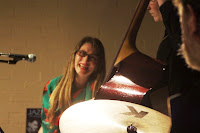






 I wrote once before on Errol Buddle and the era he represents to my ears. This time, listening to his quintet last night at the Gods, I particularly noticed the two-feel on Bob’s drumming that was almost a constant through the night. Also the malleable pitch of both horns up front (maybe less constant) and the relatively consonant sound and the massive tone of Errol’s tenor and the delicious counterpoint from Ed Wilson’s trombone. (No surprise here: Ed Wilson was one half of the legendary Daley/Wilson Big Band). This was attractive and endearing music, and the repertoire was part of the reason. Errol once mentioned that Duke Ellington wrote over 1,000 tunes. The band played several of them, along with Cole Porter and some other mega-standards: Caravan, Take the A Train, Don’t get around much anymore, Night and day, But not for me, Anything goes, The man I love, It don’t mean a thing if it ain’t got that swing, Perdido, Basin Street Blues. There were lyrics, too. Ed sang Louis-like and also a scat solo through his trombone mute (!). Marée sang Cole Porter’s witty Anything goes, but I particularly liked her take on The man I love which was undemonstrative and somewhat defensive: it spoke dignified resignation to my ears, which seems just right for this tragic song. At one time, Errol joked that he’d been asked while on a Russian tour what key he plays C-Jam blues in: “Which key”, “It’s only got two notes”, “Which two notes?”. Comedy is in the timing. When I arrived, I found Jared Plane sitting waiting. Jared was sitting in for the night (which he played with sharp technique and some lovely melodious solos), but the band hadn’t arrived. They were coming via Yass after following defective GPS instructions. In the end, they were only a few minutes late on stage, but with the query: “Why is Canberra so hard to find?” The night was like this. Big tone and great tunes, steady cut times and some delicious counterpoint. Well enjoyed.
I wrote once before on Errol Buddle and the era he represents to my ears. This time, listening to his quintet last night at the Gods, I particularly noticed the two-feel on Bob’s drumming that was almost a constant through the night. Also the malleable pitch of both horns up front (maybe less constant) and the relatively consonant sound and the massive tone of Errol’s tenor and the delicious counterpoint from Ed Wilson’s trombone. (No surprise here: Ed Wilson was one half of the legendary Daley/Wilson Big Band). This was attractive and endearing music, and the repertoire was part of the reason. Errol once mentioned that Duke Ellington wrote over 1,000 tunes. The band played several of them, along with Cole Porter and some other mega-standards: Caravan, Take the A Train, Don’t get around much anymore, Night and day, But not for me, Anything goes, The man I love, It don’t mean a thing if it ain’t got that swing, Perdido, Basin Street Blues. There were lyrics, too. Ed sang Louis-like and also a scat solo through his trombone mute (!). Marée sang Cole Porter’s witty Anything goes, but I particularly liked her take on The man I love which was undemonstrative and somewhat defensive: it spoke dignified resignation to my ears, which seems just right for this tragic song. At one time, Errol joked that he’d been asked while on a Russian tour what key he plays C-Jam blues in: “Which key”, “It’s only got two notes”, “Which two notes?”. Comedy is in the timing. When I arrived, I found Jared Plane sitting waiting. Jared was sitting in for the night (which he played with sharp technique and some lovely melodious solos), but the band hadn’t arrived. They were coming via Yass after following defective GPS instructions. In the end, they were only a few minutes late on stage, but with the query: “Why is Canberra so hard to find?” The night was like this. Big tone and great tunes, steady cut times and some delicious counterpoint. Well enjoyed.Errol Buddle (tenor, alto, soprano saxes, flute) led a quintet with Ed Wilson (trombone, bass trumpet, vocals), Marée Steinway (piano, vocals), Jared Plane (bass) and Bob Baird (drums). Also great to catch up with Ron Lucas. Ron’s a pianist with a long history in jazz and popular music and, interestingly, pianist for a scene in the Mick Jagger Ned Kelly movie.







